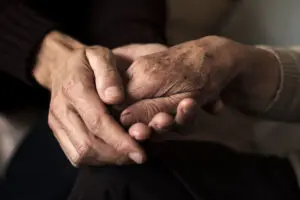
- Grieving is a process. Grief has no “should’s” or “supposed to’s”. It is not linear and often does not appear to “make sense.” It does not look any one way. Your partner’s grief will unfold over time and vary greatly day-to-day and minute-to-minute. Try to suspend any agenda you might hold about how it will look.
- Error on the side of bringing up the loss more, not less. We sometimes worry that bringing up a loss will cause the grieving person to “remember” their grief when they might otherwise be fine or distracted. This can often backfire and leave the grieving person to feel alone in their emotions. As a couples therapist, I see a lot of conflict surrounding one partner grieving and feeling the other “doesn’t care” or that they are “off of their partner’s radar.” Even if it hurts your partner to be in the head-space of processing their loss, they will likely feel well cared for by you.
- Have a system of checking in with your partner on a daily basis. Consider a way of checking in that allows your partner to share as much or as little as they feel like that day. An idea that works well is using a number scale from 1-10, 10 being an ideal day. You can ask how your partner is on a 1-10 so that they can either simply give you a number (if they don’t feel like talking but still give you an indication of how they are doing and how much/little support they need) or share fully how they are feeling (emotions that are coming up, how they are coping, worries they have, etc.)
Involve the use of physical touch when providing comfort. Most people find comfort in physical touch. Successfully helping someone while they are grieving is often way more about your presence physically, emotionally, mentally than anything you actually say to the grieving person. Try rubbing your partner’s back or giving them a hug or even just sitting close to them. Shut out other interruptions and try being fully present and in the moment with them.
- Use the deceased person’s name and relationship to your grieving partner such as “your Dad” or “your grandmother.” Most people find comfort in using the name of the loved one they have lost. Names are very personal and obviously unique to the person who has died. Similarly, if there are symbols associated with the loss, use them. For example, if your partner sees a butterfly and feels a connection to their loved one, you could mention the next time you see a butterfly. You can also bring up their memory in things that genuinely remind you of the deceased person, such as hearing their favorite song on the radio or viewing a beautiful sunset.
- Validate any emotions your partner is experiencing. Anything goes in grieving. Most commonly, grieving people feel an array of confusing and often conflicting emotions. They can seem to go from being happy one minute to sobbing the next, and this is normal. When people are processing a death-related loss, they are processing through layers upon layers of meaning which ignites many different emotions. Reassure them that however they are feeling is normal and makes sense.
- Don’t judge your own lack of emotional connection to the loss. While your partner is feeling a great deal, you might not have a lot coming up for you personally. It is common for this to cause guilt. Remember that all emotion in loss is normal, even lack of emotion. We cannot choose how we feel any more than we can choose feeling hungry, thirsty, or tired. You don’t need to be feeling negative emotion in order to support your partner through their journey of grieving.
Try to find a system for remembering and honoring anniversaries. Having ritual is a big part of processing grief and finding meaning after loss. It can be helpful to celebrate or acknowledge an anniversary such as the deceased person’s birthday, holidays, and the anniversary of the person’s death. Keep a record of these dates so that you can initiate support around these days. There is no statute of limitation on grieving. Again, grief processes in layers and over time and life forces us to peel back new layers of grief all the time. There is no timeline and people should be allowed to grieve.
- Grief can slide into depression or co-occur with depression. If you are worried your partner is depressed (trouble sleeping or sleeping too much, experiencing hopeless, ongoing loss of interest in activities they previously enjoyed, irritability) reach out and get help from a mental health provider.


 Involve the use of physical touch when providing comfort.
Involve the use of physical touch when providing comfort. Try to find a system for remembering and honoring anniversaries.
Try to find a system for remembering and honoring anniversaries.

